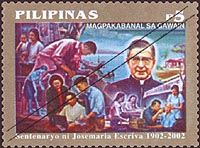| The Philippine Postal Corporation
will issue a stamp to commemorate the Birth Centenary of Josemaria Escriva,
Priest and Founder of Opus Dei.
Josemaria Escriva was born
in Barbastro. Spain on January 9, 1902. He was ordained priest on March
28, 1925. On October 2, 1928, following divine inspiration, he founded
Opus Dei, an institution of the Catholic Church that has opened up a way
of sanctification for ordinary people, through daily work and the fulfillment
of personal, family, and social duties.
"Now raised to the altars
of the Church, Blessed Josemaria Escriva reminds us, more forcefully than
ever, that the divine paths of the earth have been opened up for everyone,"
declared Pope John Paul II during the beatification ceremonies of May 17,
1992 before some 300,000 pilgrims in St Peter's Square in Rome. Lately,
on December 20, 2001 Pope John Paul II approved a decree on a miracle attributed
to the intercession of Josemaria Escriva thus completing the formal requirements
for his canonization. The remaining steps are for
the Vatican to set a canonization
date and for the Pope to solemnly proclaim that Blessed Josemaria Escriva
is to be included among the Saints.
To celebrate the Centenary,
all throughout the year 2002 and culminating on January 9, 2003, commemorative
events will be held and various social projects will be launched all over
the world, including the Philippines. Devotion to Escriva is wide spread
in the Philippines among people of all walks of life. Since the start of
stable apostolic work of Opus Dei in the country in 1964, hundreds of thousands
have been inspired by Escriva's teachings. Many have come to know him through
his spiritual books, foremost among them. The Way (Ang Daan, in Tagalog),
which has sold over 4 million copies worldwide. Since his death on June
26, 1975. devotees have organized Solemn Masses yearly around that date
in the major cities of the country. Many seek his intercession in prayer
and have received spiritual and material favors, including miraculous cures.
Following Escriva's impulse,
the people of Opus Dei in the Philippines have established many educational,
cultural, spiritual and social outreach projects. These include the Makiling
Conference Center (Calamba), the University of Asia and the Pacific (Pasig),
the Center for Industrial Technology and Enterprise (Cebu), Dualtech Training
Centers (Manila and Canlubang), Punlaan School (San Juan), the Anihan Rural
Development Center (Calamba), Family Farm Schools in Balete, Lipa, Jala-jala,
Tuy, Bais, and Dingle, and over 30 cultural and study centers throughout
the country for students and professionals.
At the core of Escriva's
teachings is the message that any honest work, done well. as a service
to God and fellowmen, is a means for ordinary men and women to become saints.
This is the message he has wanted his spiritual children to spread all
over the world. This is what Taytay artist, Godofredo F. Zapanta, Sr.,
has depicted in his oil painting used for the commemorative stamp.
Escriva entrusted his Filipino
children with the task of the evangelization of Asia, where millions, he
said, still have to hear about Jesus Christ. He said that with their oriental
features, the Filipinos will be received well anywhere in Asia and that
they should go "due in altum" (cf. Luke 5:4) "into the deep seas" of the
archipelago and beyond. From the Philippines, Opus Dei has established
stable apostolic work in Hongkong, Singapore, Taiwan, and Macao. Escriva's
message of holiness in work and in the fulfillment of ordinary duties continues
to
spread to the different
Asian countries. |


